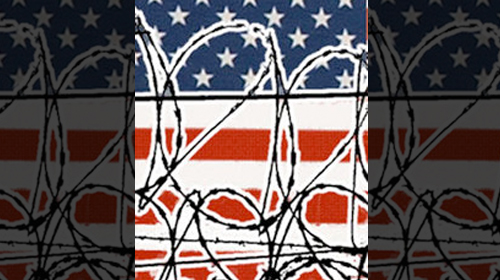
Today I write from Guantánamo Bay, where I just watched former CIA prisoner Majid Khan plead guilty to various war crimes. By pleading guilty and agreeing to testify against other Guantánamo prisoners in future military commissions, Khan will be sentenced to no more than 19 years. His sentence starts today. He does not get any credit for the almost nine years he has already served in Guantánamo and CIA prisons. If Khan had gone forward with a trial and been found guilty by a jury, he could have gotten a life sentence.
However, any plea deal and testimony must be seen in the context of Khan's years of secret, incommunicado detention and torture at the hands of the CIA, and the prospect of trial by an unfair military commissions system.
In documents released in 2009 by the government via an ACLU Freedom of Information Act lawsuit, Khan said that he had been abused while in custody. According to declassified transcripts of his Combatant Status Review Tribunal, which determine if Guantánamo prisoners qualify as "enemy combatants," Khan said, "In the end, any classified information you have is through [CENSORED] agencies who physically and mentally tortured me." The military commissions system allows coerced evidence to be used.
Khan will get his final sentence in four years, presumably after the trials at which he will testify are completed. At that sentencing hearing years from now, Khan can present evidence of his torture and abuse as mitigation, hoping the Convening Authority (the Pentagon official who determines Khan's final sentence) will give an ultimate sentence of less than 19 years. As part of the plea deal, the Convening Authority has recommended Khan not be kept in Camp 7, where the men against whom Khan would likely testify are housed.
At the conclusion of Khan's sentence, whatever that may be, the government nevertheless continues to reserve the right to hold him as an enemy of the United States. When Khan was asked by the judge whether he understood that, he replied, "I'm making a leap of faith here, sir. That's all I can do." A former U.S. resident whose parents and siblings live in the Baltimore area, Khan was dressed in a well-tailored suit, with short hair and a small beard.
At any trial at which Khan testifies, defense lawyers are certain to question him about the abuse and torture Khan suffered while in CIA hands. Khan's lawyers have stated that every technique used against Khan is already in the public domain, but to date, every mention by Khan or his lawyers of the details of that treatment has been censored. Even today, when Khan began to discuss his treatment in CIA hands and the involvement of a foreign government in that treatment, military censors cut off court observers' ability to hear what was being said. Whether Khan is permitted to publicly reveal the details of torture and abuse he suffered will be a test of the Obama administration's promise that the commissions will provide transparency.
UPDATE: This post has been updated to add further details of the day's proceedings.
Learn more about indefinite detention: Sign up for breaking news alerts, follow us on Twitter, and like us on Facebook.


